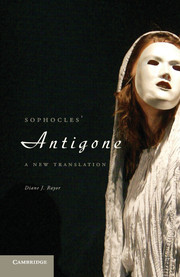Introduction
Published online by Cambridge University Press: 05 June 2012
Summary
Sophocles' Antigone is the most read and performed of all Greek tragedies. The play poses a conflict between passionate characters whose extreme stances leave no room for compromise or diplomacy. Antigone's character may also represent the rights of the individual, family, and women and the authority of traditional customs, in opposition to Kreon's representation of the law, the state, male authority, and political institutions. In addition, the important role and responsibility of the community (the chorus of elders) run as undercurrents throughout. The powerful conflict of principles in Antigone makes it highly adaptable to modern ethical dilemmas and political situations.
Greek Tragedy
Festival to Dionysos
Greek tragedy was composed for performance at an annual Athenian festival honoring the god Dionysos. That festival, called the Great Dionysia or City Dionysia, became fully integrated into the new Athenian democracy in the fifth century bce. Athenian playwrights wrote and directed all of the plays for a primarily Athenian audience of 15,000–20,000 that gathered together for a six-day festival in an act of citizenship and community.
In addition to being a political event celebrating Athenian democracy and imperial power, the City Dionysia was a religious ceremony dedicated to the worship of Dionysos, the god of theater, ecstasy, inspiration, vegetation, wine, and dithyrambic (cult) song. Dionysian dithyramb involved song, dance, masks, and costume – all major components of Greek theater.
- Type
- Chapter
- Information
- Sophocles' AntigoneA New Translation, pp. xi - xxivPublisher: Cambridge University PressPrint publication year: 2011



